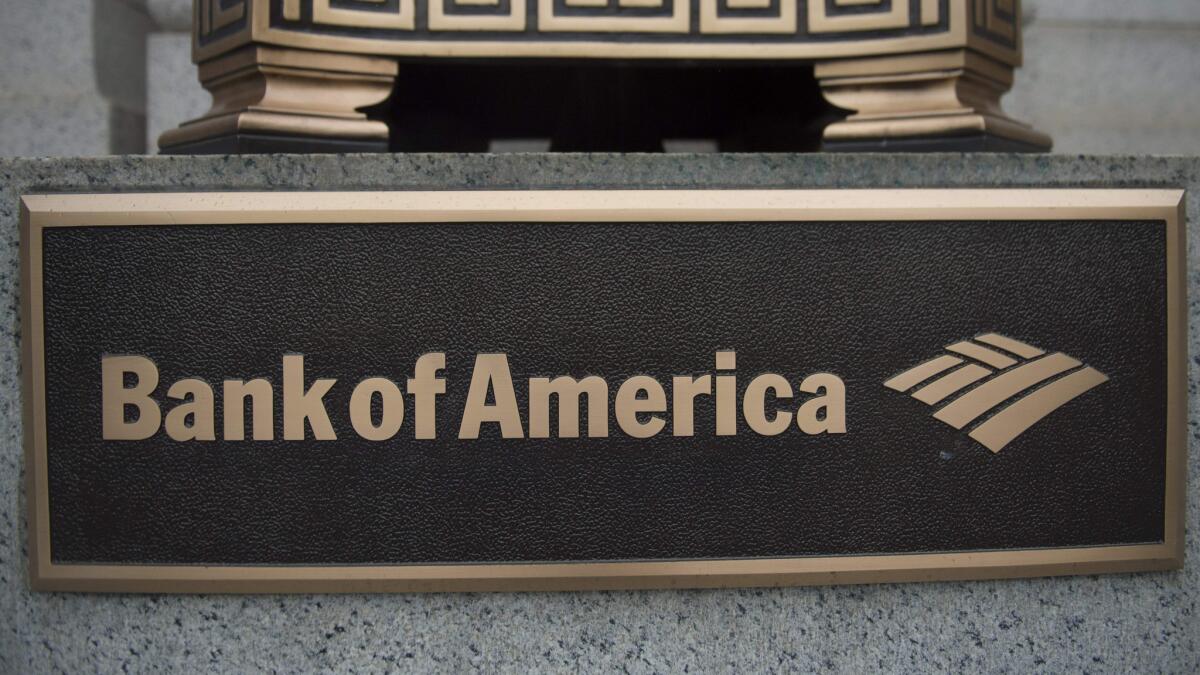The legal technicality that let BofA skate on an alleged billion-dollar mortgage fraud

- Share via
If I’m ever dragged into court for a financial fraud, I want to throw myself on the mercy of Judge Richard C. Wesley.
Wesley is the U.S. appeals court judge in New York who, with his colleagues Reena Raggi and Christopher F. Droney, found a loophole in federal fraud law big enough for the nation’s second-largest bank to fit through without even scratching a fender.
In a ruling written by Wesley and issued Monday, the three judges tossed out a $1.3-billion judgment against Bank of America for stuffing thousands of lousy mortgages into the portfolios of Fannie Mae and Freddie Mac in 2007 and 2008 by pretending they were high-quality loans. Their ruling turned on the curious question: “When is a fraud not a fraud, but just, sort of, a lie?”
(Countrywide’s ‘Hustle’ program) was...the vehicle for a brazen fraud...driven by a hunger for profits and oblivious to the harms.
— U.S. District Judge Jed S. Rakoff
Anyone concerned about white-collar crime should be find the appellate court’s logic appalling. One who does is Dennis Kelleher, a former corporate lawyer who is now CEO of the financial watchdog group Better Markets. “You wonder why the American people are so cynical,” he told me after the decision came down. “It’s because there’s an endless reservoir of ways to figure out how to hold no one accountable for illegal conduct.”
In Monday’s decision, the appellate judges didn’t actually question that the mortgages sold to Fannie and Freddie by BofA (originally via Countrywide Financial, the subprime lender BofA acquired in 2007) weren’t the quality they were claimed to be. Indeed, they didn’t really address at all that question, which was analyzed in great detail by the trial court judge who imposed the $1.3-billion penalty, New York Federal Judge Jed S. Rakoff.
Rakoff found that Countrywide/BofA set up a mortgage program known as the “High Speed Swim Lane” (HSSL), or “Hustle,” to crank out low-quality mortgages at great speed. Under the leadership of BofA executive Rebecca Mairone, Rakoff concluded, the conventional quality-control measures for mortgages were thrown out the window. (Rakoff hit Mairone with a $1-million penalty, which was also overturned by the appeals judges.)
The program transferred responsibility for vetting the loans “from quality-focused underwriters to volume-focused loan specialists” who were using automated credit software. The program also eliminated rules that paid lower commissions for low-quality loans than for good loans, and cut the turnaround time for processing mortgages to 15 days from six weeks or more.
With speed and volume taking primacy over quality, a huge percentage of these loans were destined to fail. Sure enough, more than 42% of the loans were “materially defective,” Rakoff found. As far as Fannie and Freddie knew, however, they all still met Countrywide’s contractual representation that all the loans were “investment quality.”
HSSL “was from start to finish the vehicle for a brazen fraud,” Rakoff ruled, “driven by a hunger for profits and oblivious to the harms thereby visited, not just on the immediate victims but also on the financial system as a whole.” Fannie and Freddie, he concluded, “would never have purchased any loans from the Bank Defendants if they known that Countrywide had intentionally lied to them.”
So how, you might ask, could Bank of America wriggle out of that one?
The answer is through what Kelleher calls a “hyper-technical decision.” The judges based their ruling on the contracts that Countrywide had reached with Fannie and Freddie, pledging to provide those government-sponsored firms with “investment quality” mortgages. There was no evidence, the appellate judges found, that the executives who signed those contracts intended at the time to stuff the pipeline with toxic junk. Things just turned out that way.
Because there was no intent to defraud when the contracts were signed, the judges decided, this whole affair is merely a case of breach of contract, not fraud. The penalties for a breach are much lower than those for fraud--often, the guilty party merely has to give back the money it got from breaking the contract. According to the judges’ analysis, a mere breach of contract can’t be elevated into a case for fraud.
There are a few problems with this analysis. One was pointed out presciently by Judge Rakoff in a 2013 ruling in the case, when he observed that under the federal mail fraud statute the bank’s misrepresentations were continuous and ongoing: every time it sold Fannie or Freddie a substandard loan, it was arguably lying.
The biggest danger with the court’s exoneration of the bank, however, is that it provides a road map for white-collar wrongdoers to evade responsibility. Breach-of-contract damages, as Kelleher says, have “zero deterrent effect -- there’s no downside for committing the fraud.” You either get away with it and pocket the gains, or you get caught and have to return the money. The way to stamp out fraud, however, is to make the cost of punishment greater than the potential gains.
That course was closed off by the appeals judges. Since few businesses enter into contractd plotting in advance to make them vehicles for fraud, they’ve crafted an all-purpose get-out-of-jail-free card.
It’s quite possible that the appeals court happened upon a loophole that had been lying around for years. If that’s the case, Congress should close it, quick. On the other hand, Judge Rakoff anticipated and rejected that argument, and even pointed out that Congress closed the loophole by amending the mail fraud statute -- in 1909. It’s also likely that the government will appeal the latest ruling to the full 2nd circuit court, and thence, if necessary, to the Supreme Court.
The loophole that Judges Wesley, Raggi, and Droney identified should hearten anyone motivated by pure greed in financial dealings. For the rest of us, it’s a ticking time bomb, until Congress or the courts extinguish the fuse.






